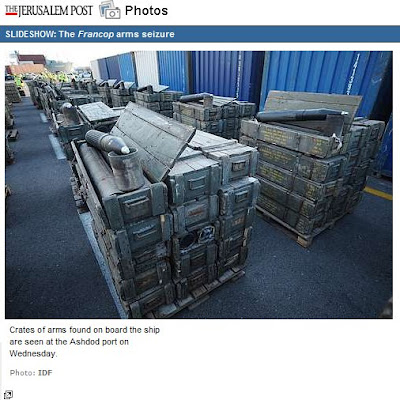Note in particular how the terrorists, acting under cover of Iran's official international shipping line IRISL and evidently with its active involvement, concealed the weaponry inside containers that were part-filled with ordinary goods like sacks of polyethylene, a thermoplastic substance that was meant to camouflage the deadly consignment. The polyethylene packs are clearly marked in English "NPC National Petrochemical Company" with a flame logo used by the company and Iran's Oil Ministry.
Haaretz points out that
IRISL is a state-controlled company with a fleet of 95 commercial ships, including 18 container ships. It plies routes to the Far East, the Gulf, Egypt and Europe. And it is one of the companies the UN Security Council listed in its sanctions resolutions against Iran, due to its role in transporting equipment for Tehran's nuclear and missile programs. The company's directors are fully aware of this problem, as are the commanders of the Quds Force - the branch of the Iranian Revolutionary Guards that is responsible for shipping arms to Syria, Hamas and Hezbollah. They all know that ships with Iranian flags, or that have been leased by IRISL, are likely to draw the attention of western intelligence services and their navies.Therefore, in an effort to divert attention, they loaded hundreds of containers onto a single Iranian ship that sailed to the Egyptian port of Dumyat. The cargo manifest described the shipment as a civilian cargo of polyethylene, a common plastic. At the Egyptian port, the containers were loaded onto Francop, a German ship that flies the flag of Antigua. Its destination was Latakia, a port in Syria, from which the arms would be smuggled overland to Lebanon.








No comments:
Post a Comment